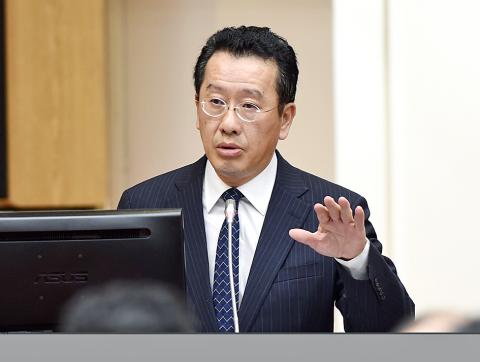As Taiwanese shares fell for the fifth consecutive session yesterday to close at their lowest level in eight months, Financial Supervisory Commission (FSC) Chairman Wellington Koo (顧立雄) said the commission might take action to prop up the local market.
The TAIEX ended down 61.19 points, or 0.58 percent, at 10,455.93, the lowest level since Feb. 12, when the index hit 10,421.09 points, Taiwan Stock Exchange (TWSE) data showed.
Earlier yesterday, Koo told the Legislative Yuan’s Finance Committee that if the TAIEX fell below 10,500 points, the commission might take some measures to keep the stock market stable, such as encouraging private firms to buy back shares and hold investors’ conferences to assure shareholders.

Photo: Chien Jung-fong, Taipei Times
The 10,500-point mark is considered psychologically important for investors, as the market tends to become volatile and bumpy whenever it falls below this level, Koo added.
However, the commission did not act yesterday, with Koo later telling reporters that he thought the 0.58 percent decline was relatively small.
The commission remained on standby “because the decline of 61.19 points today is smaller than last week’s fall” of 489.22 points, Koo said, adding that local shares had “flattened out” rather than plunging.
Lawmakers on the committee asked Koo whether the state-owned National Stabilization Fund would intervene in the stock market to support local shares.
Koo said that he was not in a position to comment on the matter.
However, he said that he remained confident in the local market as locally listed companies have sound fundamentals.
The Ministry of Finance in a statement on Sunday said that the government did not rule out the possibility of using the NT$500 billion (US$16.17 billion) fund to prop up share prices in case of volatility in global financial markets.
The stabilization fund committee might meet at any time to decide whether the fund would intervene if the local market continues to see sell-offs due to foreign fund outflows, the ministry said.
Koo said the fund had not yet intervened because the stock market is “not in disorder” and he had not seen investors make irrational decisions.
As the TAIEX moved closer to its nearest technical support at about 10,400 points, bargain hunters emerged and helped the broader market recover from the day’s low, dealers said.
“It appears that some investors are willing to hunt for bargains among non-tech stocks for the moment to prevent the TAIEX from falling further and to offset TSMC’s plunge,” Xincheng International Investment Consultant (信誠環球投顧) analyst Chang Chih-cheng (張志誠) said.
“Judging from the gains posted by large-cap old economy and financial stocks, I am guessing that the buying came mainly from government-led funds, which wanted to prop up the index at a time when regional financial markets remain jittery over fund outflows,” Chang said.
Chang said the concerns were triggered by the sharp rise in the yield of benchmark US 10-year Treasuries on expectations that the US Federal Reserve could accelerate interest rate hikes.
That has pushed the value of the US dollar higher and led investors to pursue US dollar-denominated assets.
Foreign institutional investors sold a net NT$11.13 billion in shares in Taipei yesterday, TWSE data showed.

GROWING OWINGS: While Luxembourg and China swapped the top three spots, the US continued to be the largest exposure for Taiwan for the 41st consecutive quarter The US remained the largest debtor nation to Taiwan’s banking sector for the 41st consecutive quarter at the end of September, after local banks’ exposure to the US market rose more than 2 percent from three months earlier, the central bank said. Exposure to the US increased to US$198.896 billion, up US$4.026 billion, or 2.07 percent, from US$194.87 billion in the previous quarter, data released by the central bank showed on Friday. Of the increase, about US$1.4 billion came from banks’ investments in securitized products and interbank loans in the US, while another US$2.6 billion stemmed from trust assets, including mutual funds,

Micron Memory Taiwan Co (台灣美光), a subsidiary of US memorychip maker Micron Technology Inc, has been granted a NT$4.7 billion (US$149.5 million) subsidy under the Ministry of Economic Affairs A+ Corporate Innovation and R&D Enhancement program, the ministry said yesterday. The US memorychip maker’s program aims to back the development of high-performance and high-bandwidth memory chips with a total budget of NT$11.75 billion, the ministry said. Aside from the government funding, Micron is to inject the remaining investment of NT$7.06 billion as the company applied to participate the government’s Global Innovation Partnership Program to deepen technology cooperation, a ministry official told the

Taiwan Semiconductor Manufacturing Co (TSMC, 台積電), the world’s leading advanced chipmaker, officially began volume production of its 2-nanometer chips in the fourth quarter of this year, according to a recent update on the company’s Web site. The low-key announcement confirms that TSMC, the go-to chipmaker for artificial intelligence (AI) hardware providers Nvidia Corp and iPhone maker Apple Inc, met its original roadmap for the next-generation technology. Production is currently centered at Fab 22 in Kaohsiung, utilizing the company’s first-generation nanosheet transistor technology. The new architecture achieves “full-node strides in performance and power consumption,” TSMC said. The company described the 2nm process as

JOINT EFFORTS: MediaTek would partner with Denso to develop custom chips to support the car-part specialist company’s driver-assist systems in an expanding market MediaTek Inc (聯發科), the world’s largest mobile phone chip designer, yesterday said it is working closely with Japan’s Denso Corp to build a custom automotive system-on-chip (SoC) solution tailored for advanced driver-assistance systems and cockpit systems, adding another customer to its new application-specific IC (ASIC) business. This effort merges Denso’s automotive-grade safety expertise and deep vehicle integration with MediaTek’s technologies cultivated through the development of Media- Tek’s Dimensity AX, leveraging efficient, high-performance SoCs and artificial intelligence (AI) capabilities to offer a scalable, production-ready platform for next-generation driver assistance, the company said in a statement yesterday. “Through this collaboration, we are bringing two